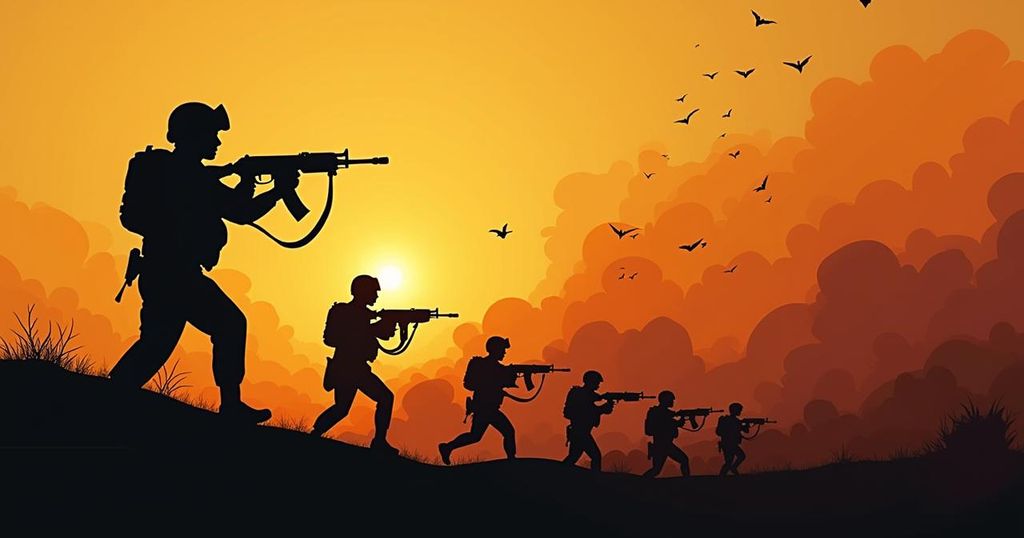Escalating Tensions in the Middle East: Conflict Between Hezbollah and Israel Intensifies

The article details recent hostilities involving Hezbollah and Israeli forces in southern Lebanon, with significant Iranian missile strikes on Israel. It highlights international reactions, including calls for de-escalation from China and Saudi Arabia, and an assessment by a military expert regarding Israel’s potential military responses. The geopolitical complexities are further underscored by Jordan’s protective measures and the reactions of global leaders to the escalating violence.
Recent conflicts between Israel and Hezbollah have intensified in southern Lebanon amidst escalated violence in the Gaza Strip. Following a Hezbollah attack in which Israeli forces incurred casualties, helicopters were reportedly deployed for the evacuation of wounded soldiers. Simultaneously, Iran has fired a substantial barrage of missiles into Israel, prompting international concern regarding the potential for further regional destabilization. In response to the escalating situation, China has called upon global powers to actively engage in de-escalation efforts, emphasizing the importance of preventing further deterioration in the region. Concurrently, Saudi Arabia’s Economy Minister expressed hope for a peaceful resolution through dialogue. Andreas Krieg, a senior lecturer at King’s College London, commented on the likelihood of Israel’s tactical responses to Iranian military actions, suggesting that attacks on military sites may be required to demonstrate Israel’s resolve. He critiqued the efficacy of targeting non-military sites, such as oil refineries, deeming such actions unjustifiable. Italian Prime Minister Giorgia Meloni has convened a meeting of G7 leaders to address the ongoing crisis, reflecting the concerns within the international community over the situation’s escalation. In the region, the Jordanian government has declared a commitment to safeguarding its sovereignty, affirming that it will not allow its territory to become a battleground during these hostilities. Reports indicate that Jordanian air defenses intercepted missiles following Iran’s attacks, which have reportedly resulted in minor injuries within the kingdom. Israeli forces were also noted to have crossed briefly into Lebanese territory before retracting, further complicating the border situation. The ongoing conflict has drawn comments from India’s foreign ministry, which urged all parties to exercise restraint and prioritize dialogue and diplomacy. Israeli officials have pledged a definitive response to the Iranian missile strikes, with Foreign Minister Israel Katz publicly barring UN Secretary-General Antonio Guterres from entering Israel, criticizing him for not condemning Iran’s actions vehemently enough. Hezbollah’s media office, led by spokesperson Mohammad Afif, asserted their readiness to engage in further military action against Israel, proclaiming that their current efforts are merely a precursor to more intensified campaigns against Israeli military interests.
The article discusses the escalating conflict in the Middle East, particularly the renewed hostilities between Hezbollah and Israeli forces in Lebanon, coinciding with Iran’s missile strikes on Israel. The situation is characterized by increasing military actions, geopolitical tensions, and diplomatic efforts by various countries to contain the crisis. The complexities of the Israeli-Palestinian conflict and Iran’s role as a key player in the region are pivotal to understanding the broader implications of the current clashes. The responses of global powers, regional governments, and military analysts reflect the intricate dynamics at play in this volatile environment.
In conclusion, the ongoing violence between Hezbollah and Israel has highlighted the fragility of the situation in the Middle East, with multiple nations expressing concern over the potential for escalation. The international community’s calls for restraint and dialogue underscore the urgency of addressing underlying tensions. As the regional dynamics continue to unfold, the possibility of further military action and its ramifications remain a critical focus for policymakers and analysts alike.
Original Source: www.aljazeera.com








